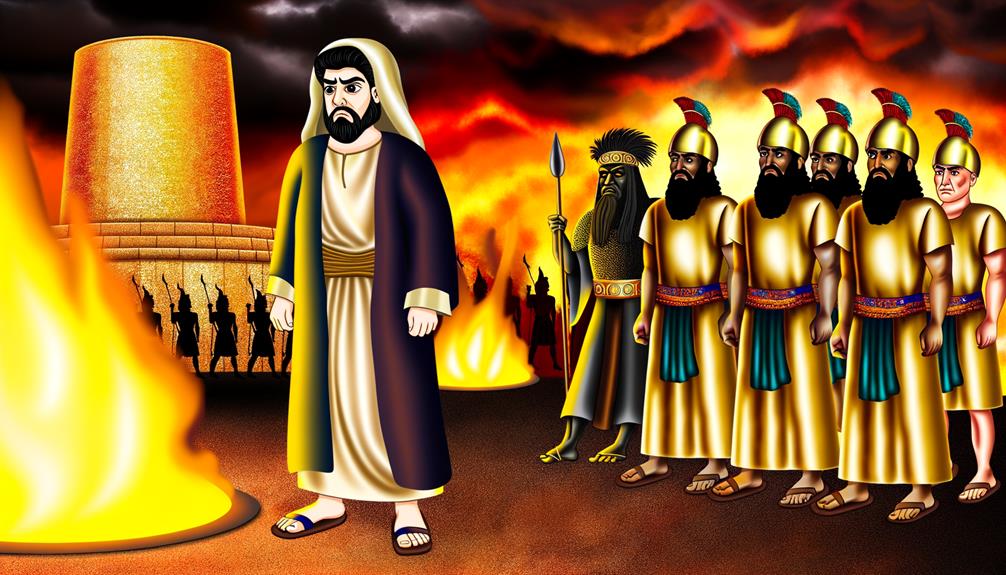Meaning of Hananiah in the Bible: God Is Gracious
Hananiah, whose name means ‘Yahweh is gracious,’ plays multiple significant roles in the Bible. In the Book of Daniel, he is Shadrach, symbolizing steadfast faith amid cultural pressure.
The prophetic Hananiah challenged Jeremiah, offering a controversial message of imminent deliverance. Another Hananiah served as a priest during King Zedekiah’s reign, maneuvering the complex interplay of faith and politics.
Additionally, in Nehemiah’s account, Hananiah demonstrated exceptional leadership and spiritual devotion during Jerusalem’s reconstruction. His name underscores themes of divine grace, hope, and restoration, woven throughout various biblical narratives, enriching our understanding of God’s enduring promise to His people.

Meaning of Hananiah in the Bible: God Is Gracious and Faithful
| Aspect | Biblical Reference | Spiritual Insight |
|---|---|---|
| Name Meaning | Hananiah means “Yahweh is gracious” | Emphasizes God’s kindness and favor toward His people |
| Prophetic Role | Several prophets and leaders named Hananiah | Symbolizes divine appointment and calling |
| False vs. True Prophets | Hananiah in Jeremiah opposed Jeremiah’s word | Teaches discernment between true and false prophecy |
| Faith in Trials | Hananiah (Shadrach) stood firm in Babylon | Shows boldness in faith and God’s deliverance |
| Divine Grace | Reflects God’s mercy even in judgment | Encourages trust in God’s goodness and plan |
Hananiah in the Book of Daniel

In the Book of Daniel, Hananiah is introduced as one of the young Hebrew men taken into Babylonian captivity, where his faith and identity are tested in a foreign land.
Renamed Shadrach by the Babylonians, Hananiah, along with his companions, faces intense pressure to conform to Babylonian customs and religious practices.
Despite these challenges, he demonstrates unyielding adherence to his Jewish faith, most importantly refusing to bow to King Nebuchadnezzar’s golden image.
This act of defiance, rooted in deep spiritual conviction, underscores the theme of steadfast faith amidst adversity.
Hananiah’s story highlights the tension between cultural assimilation and religious fidelity, reflecting broader narratives of identity preservation in the face of external pressures.
His narrative is a profound exemplification of unwavering faith.
The Prophetic Hananiah

The Prophetic Hananiah, a figure in the Book of Jeremiah, is primarily known for his bold proclamation that the Babylonian yoke over Judah would be broken within two years.
This audacious prophecy directly challenged Jeremiah’s warnings of prolonged exile, triggering a theological confrontation between the two prophets.
Analyzing Jeremiah’s response to Hananiah’s optimistic narrative reveals deeper insights into the prophetic tensions and the broader implications for the people of Judah.
Hananiah’s Bold Prophecy
Despite the prevailing sentiment of despair among the Israelites during the Babylonian exile, Hananiah’s bold prophecy offered a strikingly optimistic counter-narrative that promised imminent relief and restoration.
Hananiah proclaimed that within two years, God would break the yoke of Babylon, returning the exiled people and sacred temple vessels to Jerusalem. His prophecy directly contradicted the more somber messages of continued suffering and long-term exile conveyed by Jeremiah.
Hananiah’s declaration captivated the hopes of a desperate nation longing for deliverance. By advocating an imminent divine intervention, Hananiah sought to reinvigorate the national spirit.
However, his optimistic outlook, while emotionally uplifting, was met with skepticism from some quarters, raising significant theological and prophetic tensions within the community.
Jeremiah’s Response Explained
Jeremiah’s response to Hananiah’s optimistic prophecy was marked by a profound sense of caution and skepticism, which underscored the competing theological narratives within the exilic community.
Jeremiah recognized the inherent dangers of Hananiah’s message, which promised a swift end to Babylonian captivity.
His reaction was not merely a rebuttal but a measured warning against false hope, emphasizing the need for discernment in prophetic messages. This interaction highlighted the critical need for accurate divine communication and the peril of misleading prophecies.
| Aspect | Jeremiah’s Perspective |
|---|---|
| Prophetic Accuracy | Skeptical of Hananiah’s claims |
| Theological Stance | Emphasized long-term exile |
| Community Impact | Warning against false hope |
| Divine Communication | Need for discernment |
| Historical Context | Exilic period complexities |
This table succinctly encapsulates Jeremiah’s multifaceted response to Hananiah.
Hananiah the Priest

Among the various figures named Hananiah in the Bible, Hananiah the Priest stands out for his role during the tumultuous period of King Zedekiah’s reign, adding layers of complexity to the religious and political dynamics of the time.
Hananiah served in the temple and was involved in significant events that underscored the tension between prophetic messages and royal authority.
His actions, particularly in relation to the prophetic declarations of Jeremiah, reflect the intricate interplay between faith and governance.
Hananiah’s story exemplifies the challenges faced by religious leaders who navigated the fraught landscape of divine prophecy and political pressure, highlighting the broader struggle for spiritual and temporal power in ancient Judah.
Hananiah in the Lineage of David

Intriguingly, Hananiah’s presence in the lineage of David offers a profound insight into the genealogical and theological significance attributed to his name within the context of biblical history.
Hananiah, mentioned in 1 Chronicles 3:19, is noted as a descendant of Zerubbabel, a key figure in the post-exilic community. This connection places Hananiah within the royal lineage, underscoring the continuity of David’s line through the Babylonian exile and the return to Jerusalem.
The incorporation of Hananiah into this lineage not only solidifies his historical importance but also emphasizes the enduring nature of God’s promises to David’s house.
His presence symbolizes a thread of divine faithfulness woven through Israel’s tumultuous history, offering a beacon of hope and restoration.
The Role of Hananiah in Nehemiah

In the Book of Nehemiah, Hananiah is portrayed as a figure of notable leadership, exemplified by his appointment as a co-governor of Jerusalem, reflecting his exceptional integrity and fear of God.
His contributions to the rebuilding efforts are meticulously documented, highlighting his pivotal role in the restoration of the city walls.
These accounts underscore not only his administrative acumen but also his unwavering commitment to communal and spiritual rejuvenation.
Hananiah’s Leadership Qualities
Demonstrating remarkable integrity and faithfulness, Hananiah’s leadership in the Book of Nehemiah is highlighted through his appointment over Jerusalem, reflecting his exceptional qualities and trustworthiness.
Nehemiah 7:2 mentions Hananiah as a man who ‘feared God more than many,’ signifying his deep spiritual commitment. This piety, combined with his administrative acumen, made him a reliable choice to oversee the city’s reconstruction and defense.
His ability to balance spiritual devotion with practical governance underscored his capability to lead effectively.
Hananiah’s role required not only vigilance but also the ability to inspire and mobilize the community in times of distress, showcasing his adeptness in leadership and his unwavering dedication to Jerusalem’s restoration.
Hananiah’s Contributions Documented
How essential was Hananiah’s role in the Book of Nehemiah, where his contributions greatly influenced the successful reconstruction and fortification of Jerusalem?
Hananiah, distinguished as a man of integrity and godly fear, was entrusted with overseeing Jerusalem’s security alongside Hanani.
Nehemiah 7:2 elucidates Nehemiah’s trust in Hananiah’s capabilities, a reflection of his significant contributions.
| Responsibility | Contribution | Impact |
|---|---|---|
| Leadership | Appointment as co-governor | Guaranteed effective governance |
| Security Oversight | Guarded city gates | Enhanced protection |
| Religious Integrity | Upheld spiritual values | Fostered communal faith |
Hananiah’s strategic roles in security and religious integrity were vital, underscoring his indispensable influence in fortifying Jerusalem, both physically and spiritually.
Meaning and Significance of Hananiah

The name Hananiah, rooted in Hebrew origins, translates to ‘Yahweh is gracious,’ reflecting a profound theological significance interwoven throughout biblical narratives. This name underscores the benevolence and mercy of God, a recurring theme in scripture.
Hananiah appears in various roles, from a prophet during the reign of Zedekiah to a companion of Daniel in Babylon.
Each instance of Hananiah’s presence, whether in prophecy or courageous defiance, serves to illustrate divine grace and favor.
Analyzing Hananiah’s appearances highlights the embodiment of divine attributes in human actions, reinforcing the message of God’s unwavering grace.
Consequently, the name Hananiah encapsulates a multidimensional portrayal of divine kindness and its manifestation in the lives of the faithful.
Conclusion
The name Hananiah, woven through the biblical tapestry, signifies divine grace and favor.
From the steadfast faith in the fiery furnace to the prophetic declarations and priestly duties, Hananiah’s presence underscores a multifaceted role in Israel’s history.
Each figure bearing the name Hananiah reflects a unique facet of commitment to God, creating a mosaic of spiritual resilience and divine purpose.
Consequently, Hananiah remains a symbol of unwavering faith and divine favor across various biblical narratives.






